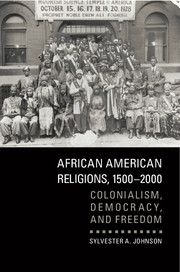Book contents
- Frontmatter
- Contents
- List of Figures
- Acknowledgments
- Introduction
- PART ONE
- PART TWO
- PART THREE
- 6 Garveyism, Anticolonialism, and State Repression of Black Religions
- 7 Fundamentalism, Counterintelligence, and the “Negro Rebellion”
- 8 Black Religion, the Security State, and the Racialization of Islam
- Conclusion: Black Religion, Freedom, and Colonialism
- Selected Bibliography
- Index
6 - Garveyism, Anticolonialism, and State Repression of Black Religions
from PART THREE
Published online by Cambridge University Press: 05 August 2015
- Frontmatter
- Contents
- List of Figures
- Acknowledgments
- Introduction
- PART ONE
- PART TWO
- PART THREE
- 6 Garveyism, Anticolonialism, and State Repression of Black Religions
- 7 Fundamentalism, Counterintelligence, and the “Negro Rebellion”
- 8 Black Religion, the Security State, and the Racialization of Islam
- Conclusion: Black Religion, Freedom, and Colonialism
- Selected Bibliography
- Index
Summary
The years of the First and Second World Wars are remembered by many scholars as the time when America's military prowess unquestionably rivaled and then surpassed that of Europe's most powerful empires. Numerous studies, moreover, have examined the period to understand the ramifications of the massive demographic shifts effected through migrations from rural to urban regions – particularly from the South to the North. And, of course, increased immigration from Africa, East Asia, Europe, South Asia, and the Caribbean during this time indelibly conditioned the growth of America's ethnics.
There is something else, however, that deeply shaped the nation – in fact, an international range of communities – during that time. A fledgling movement born in the crucible of Black diaspora consciousness created a global network of theorists, propagandists, journalists, entrepreneurs, and other activists. This was Garveyism, the political and cultural movement formalized through the renowned Universal Negro Improvement Association (UNIA). Garveyism created the world's largest popular Black movement. Its roots and reach were so vast that a historical purview must be conscientiously conceived to avoid eliding the massive body of this movement, an iceberg barely submerged beneath the surface of a sea of change and consternation that characterized the early twentieth century.
The diaspora networks and internationalism developing alongside Garveyism also spawned the rise of Black ethnic religions. Unlike the varieties of African American religions in the nineteenth century, these Black ethnic religions posed a central question: what was the original religion of Black people? Although the rejoinder varied, the centrality of this question was the manifestation of a quest for a heritage that became conceivable because of a cultural turn in the transnational, diasporic formation of racial Blackness. This turn comprised formations of Black theology that critiqued both the political aims of White religion and the colonial paradigm of White civilizationism (equating civilization with Europeanness). Although important expressions of this Black theology are evident in earlier periods (e.g., Henry McNeal Turner's emphasis on a Negro god), the UNIA became the matrix for an elaborate, institutionalized inscription of the Black gods.
- Type
- Chapter
- Information
- African American Religions, 1500–2000Colonialism, Democracy, and Freedom, pp. 273 - 324Publisher: Cambridge University PressPrint publication year: 2015
- 1
- Cited by



